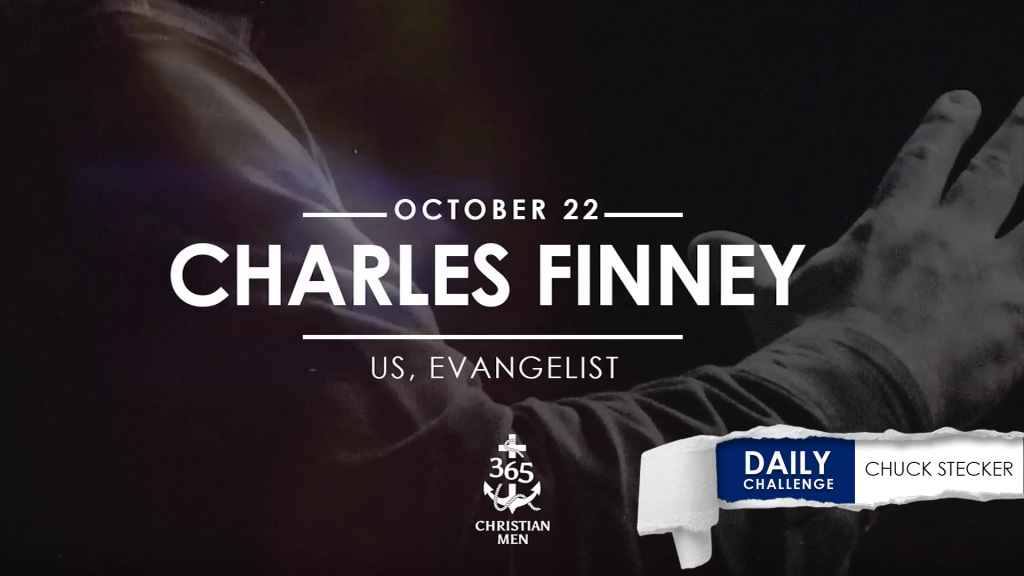October 22. Charles Finney. Finney was a lawyer turned preacher, and many people thought his preaching sounded more like legal arguments than sermons.
He became a missionary in upstate New York. But when a man said he was pleased with Finney’s sermons, the preacher was distressed. He didn’t want to be pleasing; he wanted to be effective. So, at the end of a sermon, he challenged the entire congregation: “You who have made up your minds to become Christians, and will give your pledge to make your peace with God immediately, should rise up.”
But the people had never heard an altar call; it wasn’t a thing. So, they all just sat there.
“You have rejected Christ and his gospel,” Finney said. And the dismayed congregation left the church that night.
By the third night—one guy was so mad he showed up with a gun—at the end of the sermon, when Finney called them to come forward and make peace with God, many, many people came. Afterward, Finney visited the new converts and found their lives had changed.
So he rode from town-to-town preaching repentance and helping people come to the Lord. But some clergymen thought Finney was allowing too much show of emotion, and they criticized him for his bizarre practices, which came to be called New Measures—with a capital N and M.
The unthinkable things Finney did included: allowing women to pray in public—even when both men and women were present, putting a pew at the front of the church for anyone who was worried about his salvation, and praying in common English, rather than the language of 200 years before.
When a man determines to obey God, God promises to go with him.
Finney led millions of people to Jesus, and his revival meetings changed entire cities.
In September 1830, Finney received a desperate invitation from three troubled Presbyterian churches. They wanted him to come to minister for a time in Rochester, New York.
Finney had no desire to accept the invitation due to the town’s immoral reputation and the infighting among the three churches. One of them was also without a pastor, and its members feared they would soon “be scattered, and perhaps annihilated as a church.”
But after he retired to his room, the Holy Spirit challenged Finney, saying, “Do you shun the field because there is so much that is wrong? If all was right, you would not be needed.”
Convinced that the Lord was calling him to Rochester, Finney repented of his unbelief. “I felt ashamed to shrink from the work because of its difficulties; and it was strongly impressed upon me, that the Lord would be with me, and that was my field.”
His team arrived in Rochester the next morning, and the first person they encountered was the wife of a prominent lawyer. A woman who was not pleased to see him.
“She was a very proud woman, and she greatly feared that a revival would interfere with the pleasures and amusements that she had promised herself that winter.”
In response, Finney “pressed her to renounce sin, the world, and self, and everything for Christ.” Their conversation continued for a considerable time until finally, under great conviction of sin, the lawyer’s wife knelt down to pray with Finney.
But even then, Finney battled in prayer for her, “holding her up before God as needing to be converted—to become as a little child. I felt that the Lord was answering prayer. When I stopped praying and opened my eyes, her face was turned up toward heaven, tears streaming down; and she was praying. From that moment, she was zealous for the conversion of her friends.”
This remarkable event confirmed that God had indeed sent Finney to Rochester, and it was only the beginning of a mighty move of the Holy Spirit: “The Lord was aiming at the conversion of the highest classes of society. My meetings soon became thronged with that class: lawyers, physicians, merchants, and indeed all the most intelligent people became more and more interested. They became very anxious and came freely to our meetings; and numbers of them came forward and publicly gave their hearts to God.”
During his time in Rochester, the Lord led Finney and his team to continually labor in prayer for the work they were doing. “The spirit of prayer was poured out powerfully, so much so, that some persons stayed away from the public services to pray.”
The results were undeniable, for as Finney preached from church to church, revival swept across the whole city.
Charles P. Bush, a native of Rochester who came to Jesus during the revival, later remarked: “The whole community was stirred. Religion was the topic of conversation in the house, in the shop, in the office, and on the street … Grog shops were closed, the Sabbath was honored, the sanctuaries were thronged with happy worshippers … There was a wonderful falling off of crime. The courts had little to do, and the jail was nearly empty for years afterward.”
“To obey is better than sacrifice, and to heed is better than the fat of rams” (1 Samuel 15:22 NIV).
What would it be like to see God touch others powerfully through you? When a man determines to obey God, God promises to go with him.
Finney, Charles G. The Autobiography of Charles Finney. Bloomington, MN: Bethany House Publishers, 2006.
Hyatt, Eddie. 2000 Years of Charismatic Christianity. Lake Mary, FL: Charisma House, 2002.
Johnson, James E. “Charles Gradison Finney: Father of American revivalism.” Christianity Today. October 1, 1988. https://www.christianitytoday.com/history/issues/issue-20/charles-grandison-finney-father-of-american-revivalism.html.
Story read by: Chuck Stecker
Introduction read by: Daniel Carpenter
Audio production: Joel Carpenter
Editor: Teresa Crumpton, https://authorspark.org/
Project manager: Blake Mattocks
© 2020, 365 Christian Men, LLC. All rights reserved.





